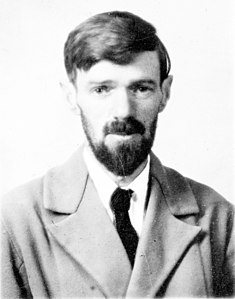Analysis of Monologue of a Mother
David Herbert Lawrence 1885 (Eastwood, Nottinghamshire) – 1930 (Vence)
This is the last of all, this is the last!
I must hold my hands, and turn my face to the fire,
I must watch my dead days fusing together in dross,
Shape after shape, and scene after scene from my past
Fusing to one dead mass in the sinking fire
Where the ash on the dying coals grows swiftly, like heavy moss.
Strange he is, my son, whom I have awaited like a loyer,
Strange to me like a captive in a foreign country, haunting
The confines and gazing out on the land where the wind is free;
White and gaunt, with wistful eyes that hover
Always on the distance, as if his soul were chaunting
The monotonous weird of departure away from me.
Like a strange white bird blown out of the frozen seas,
Like a bird from the far north blown with a broken wing
Into our sooty garden, he drags and beats
From place to place perpetually, seeking release
From me, from the hand of my love which creeps up, needing
His happiness, whilst he in displeasure retreats.
I must look away from him, for my faded eyes
Like a cringing dog at his heels offend him now,
Like a toothless hound pursuing him with my will,
Till he chafes at my crouching persistence, and a sharp spark flies
In my soul from under the sudden frown of his brow,
As he blenches and turns away, and my heart stands still.
This is the last, it will not be any more.
All my life I have borne the burden of myself,
All the long years of sitting in my husband’s house,
Never have I said to myself as he closed the door:
“Now I am caught!—You are hopelessly lost, O Self,
You are frightened with joy, my heart, like a frightened mouse.”
Three times have I offered myself, three times rejected.
It will not be any more. No more, my son, my son!
Never to know the glad freedom of obedience, since long ago
The angel of childhood kissed me and went. I expected
Another would take me,—and now, my son, O my son,
I must sit awhile and wait, and never know
The loss of myself, till death comes, who cannot fail.
Death, in whose service is nothing of gladness, takes me:
For the lips and the eyes of God are behind a veil.
And the thought of the lipless voice of the Father shakes me
With fear, and fills my eyes with the tears of desire,
And my heart rebels with anguish as night draws nigher.
| Scheme | ABCABC BDEBDE XDFXDF GHIGHI JKLJKL XMNXMNO EOEBB |
|---|---|
| Poetic Form | |
| Metre | 1101111101 1111101111010 1111111001001 110101101111 101111001010 101101011101101 111111110101010 111101000101010 01010110110111 1011101110 11010111101 00100110100111 101111110101 1011011110101 011010101101 1111010001001 1110111111110 110011001001 111011111101 101011110111 101010101111 111111001000111 0111100101111 111010101111 11011111101 11111101011 101111001101 101111111101 111111100111 1110111110101 111110111010 1111101111111 10110110101001101 0101111011010 0101110111111 11101010101 01111111101 101101101111 1010011110101 0011011101011 1101111011010 011101101111 |
| Closest metre | Iambic hexameter |
| Characters | 2,250 |
| Words | 437 |
| Sentences | 16 |
| Stanzas | 7 |
| Stanza Lengths | 6, 6, 6, 6, 6, 7, 5 |
| Lines Amount | 42 |
| Letters per line (avg) | 41 |
| Words per line (avg) | 10 |
| Letters per stanza (avg) | 248 |
| Words per stanza (avg) | 62 |
Font size:
Submitted on May 13, 2011
Modified on March 05, 2023
- 2:11 min read
- 46 Views
Citation
Use the citation below to add this poem analysis to your bibliography:
Style:MLAChicagoAPA
"Monologue of a Mother" Poetry.com. STANDS4 LLC, 2024. Web. 2 May 2024. <https://www.poetry.com/poem-analysis/7859/monologue-of-a-mother>.


Discuss this David Herbert Lawrence poem analysis with the community:
Report Comment
We're doing our best to make sure our content is useful, accurate and safe.
If by any chance you spot an inappropriate comment while navigating through our website please use this form to let us know, and we'll take care of it shortly.
Attachment
You need to be logged in to favorite.
Log In